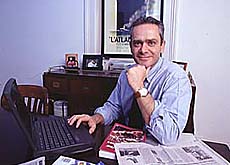
Former Swiss agent uncovers world of spying

A former Swiss spy has shed light on the intelligence services by writing a new book on the subject.
Jacques Baud told swissinfo that the role of secret services is to help prevent conflicts. Politicians sometimes ignore their information at their own peril.
Baud, who has just published “The Asymmetric War” (currently only available in French), also recently brought out the second edition of his “Intelligence and Secret Services Encyclopaedia”.
The former spy has worked in several African countries as part of his work for the Swiss government, often gathering information on terrorist networks.
He argues that the United States failed to gather sufficient evidence from the Central Intelligence Agency (CIA) before starting a war with Iraq.
swissinfo: Who is your encyclopaedia aimed at?
Jacques Baud: My book is mainly aimed at academics, but most people – the “John Does” of this world – are interested in the book.
With the democratisation process of Eastern Europe a lot of countries were interested in understanding how intelligence in a democratic society should work. Some intelligence services actually use my book as a tool to train their agents.
swissinfo: Is it not paradoxical that you’ve written a book about how secret agents work?
J.B.: No, because what is secret about intelligence are the methods and how [spies] actually work in the field. The rest is not a secret.
After the publication of the first edition of my book, I received a lot of information that was provided spontaneously by intelligence services around the world because they wanted to be properly understood.
And the book itself was very well received within the intelligence community.
swissinfo: Is the recruitment by the intelligence services in Switzerland more, or less, open than in other countries?
J.B.: Both. It’s more open in Switzerland because you have advertisements in papers. But on the other hand it’s not stated that the jobs are for intelligence – they just ask for analysts. But intelligence organisations in Switzerland are small because we’re a small country.
And these tend to be more analytical services, rather than services for gathering information. The Israelis or the Americans, for instance, have huge information-gathering services that include spy networks and so on. And they can afford it too.
In Switzerland, we don’t think that this is necessary.
swissinfo: How do the intelligence services in Switzerland ensure that their work does not undermine Swiss neutrality?
J.B.: Intelligence is a passive activity. Some countries have covert operations, but Switzerland does not. Neutrality is not an issue in that respect.
But it does become relevant when it comes to exchanging information with other intelligence services. Imagine where Switzerland would be if it always put neutrality first?
swissinfo: How do other intelligence services cope when they are not taken seriously by the governments for which they work?
J.B.: That’s what we are witnessing right now in the Iraqi crisis. What is disappointing is that the most comprehensive intelligence service in the world is not able to gather evidence to make a proper decision about a war.
Basically that’s not new. But a political decision is very often more an emotional one [rather] than a rational one. We know that US intelligence services, especially the CIA, were very upset when Colin Powell addressed the United Nations Security Council with alleged proof about Iraqi breaches.
The CIA is aware that they don’t have the proper intelligence to start a war. What I know is that intelligence services have a lot of brilliant analysts, who have a very deep knowledge about culture, politics and people in “target countries”. The politicians have other objectives and usually disregard intelligence.
swissinfo: How can the Swiss government really keep on top of what’s happening in Iraq?
It’s only the coalition forces that really have a clear view of what’s going on the battlefield.
Since their debacle in Somalia, the Americans have put on a lid on information exchange, and everyone’s feeling the consequences.
During the first Gulf War, the Americans were giving out more precise information about the battles. But they’ve changed their strategy since then because they felt that [sharing too much information] had negative consequences for them.
swissinfo: Would a potential way forward be to put more emphasis on intelligence services?
J.B.: There is definitely a role for strategic intelligence today, which is to identify potential risks instead of waiting for problems to arise. The goal is to handle things immediately – not by military means – but with social or financial means to prevent potential sources of conflict.
swissinfo interview: Faryal Mirza
Jacques Baud was born in 1955.
He studied economics at the University of Geneva.
After university, Baud worked at the United Nations in New York, where he worked on the elimination of antipersonnel mines. He was later in charge of security for refugee camps in Zaire.
Baud, a colonel in the Swiss army, worked for Swiss intelligence from 1983 to 1990.
He has written a number of books on the intelligence services, including the “Encyclopaedia of information and secret services” and the “Encyclopaedia of Terrorism” (in French).

In compliance with the JTI standards
More: SWI swissinfo.ch certified by the Journalism Trust Initiative






























You can find an overview of ongoing debates with our journalists here . Please join us!
If you want to start a conversation about a topic raised in this article or want to report factual errors, email us at english@swissinfo.ch.